For decades, the Pakistani state has consistently broken its promises to the people of Balochistan, fueling a deep-seated sense of mistrust and alienation among the Baloch populace. Despite numerous pledges of autonomy, development, and political inclusion, Islamabad has repeatedly failed to deliver. Balochistan’s rich natural resources, including gas, minerals, and fisheries, have long been exploited to benefit other regions, particularly Punjab and Islamabad, while Balochistan itself remains the least developed and most marginalized. This exploitation has led many Baloch to believe that their land is seen as a cash cow — its wealth drained to finance other regions, with little reinvestment in local infrastructure, education, or healthcare.
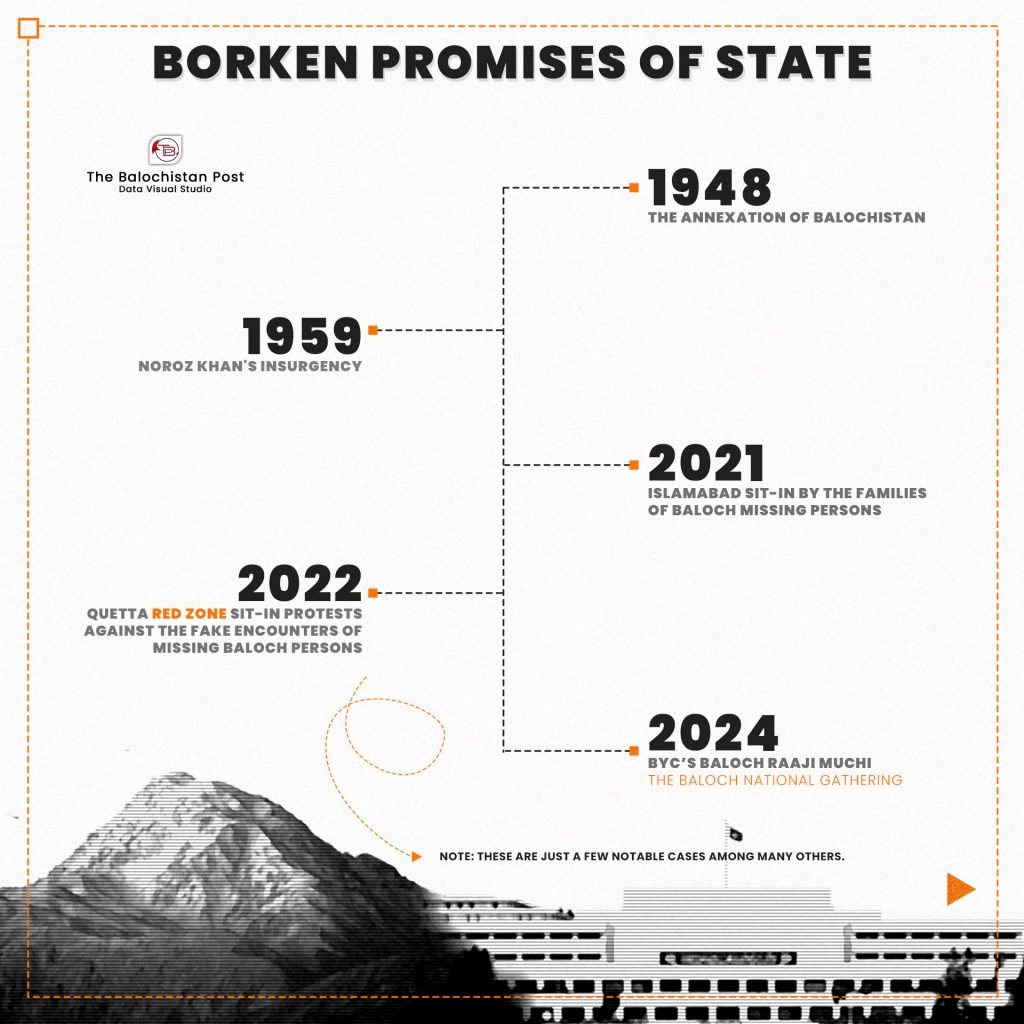
The state’s repeated failure to fulfill its promises has only deepened the divide between Balochistan and Pakistan. The promises made to the Baloch people, whether in the context of autonomy, political representation, or development, have frequently been broken without remorse. This has resulted in a pervasive sense of betrayal, with many Baloch viewing the state as more of an oppressor than a protector. The instances of broken promises, such as those made in 1948, 1959, 2021, 2022, and 2024, have not only eroded trust but have also contributed to the ongoing unrest and resistance within Balochistan.
1948: The Annexation of Balochistan
In 1948, the annexation of Balochistan marked the beginning of a long history of broken promises by the Pakistani state. Muhammad Ali Jinnah, Pakistan’s founding leader, had assured the Khan of Kalat that Balochistan would be granted autonomy, control over its own resources, and respect for its sovereignty. Balochistan was forcefully annexed to Pakistan with the promise that its interests would be safeguarded. However, these promises were swiftly betrayed. The central government moved to impose direct control over the region, effectively stripping Balochistan of its autonomy and ignoring the initial agreements made during the annexation process.
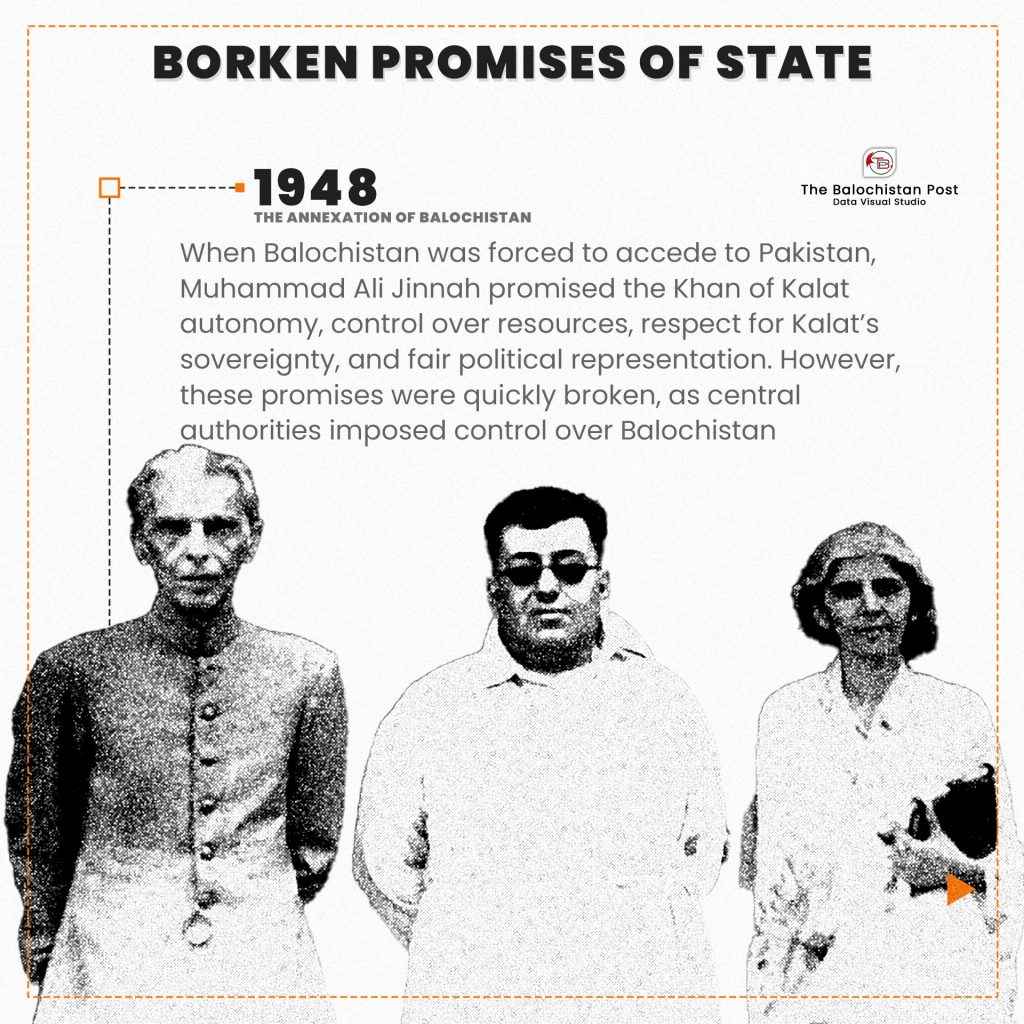
In the years that followed, Balochistan’s resources, particularly its natural gas, were extracted for the benefit of the rest of the country, while Balochistan itself remained underdeveloped and politically marginalized. The promises of autonomy and resource control that were central to Balochistan’s accession were disregarded, setting the stage for decades of mistrust. This initial breach of trust has had long-lasting consequences, shaping the Baloch people’s perception of the state as untrustworthy and exploitative, laying the groundwork for the resistance and insurgencies that would follow in the years to come.
1959: Nawab Nauroz Khan’s Insurgency
In the wake of the One Unit Scheme in 1955, which merged Balochistan with the provinces of West Pakistan, discontent within the region grew. The Baloch people, who had already felt sidelined politically and economically, saw this move as an erasure of their distinct identity. By 1958, Nawab Nauroz Khan, a prominent tribal leader, took up arms in resistance, demanding not only the abolition of the One Unit Scheme but also the release of the Khan of Kalat, who had been imprisoned for opposing the merger. The government, seeking to quell the uprising, promised Nawab Nauroz Khan safe conduct in case of a peaceful surrender — a promise sworn on the Holy Quran.
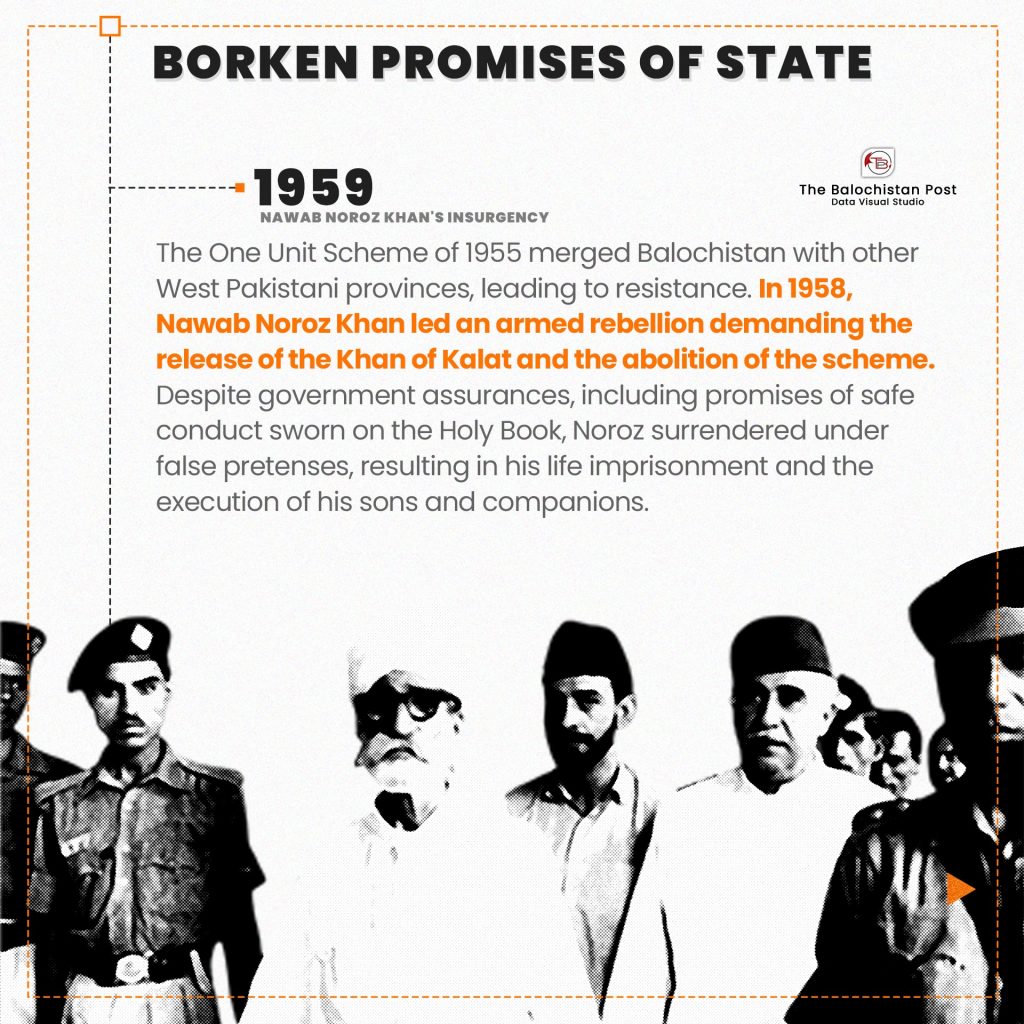
However, the Pakistani state once again broke its word. After surrendering, Nauroz Khan was imprisoned for life, and his sons and companions were executed. This incident left a deep scar on the collective memory of the Baloch people, further solidifying their mistrust of the state. The betrayal of sacred promises, especially ones sworn on religious grounds, reinforced the belief that the government would stop at nothing to suppress Baloch dissent, using deception and force as its primary tools. The execution of Nauroz Khan’s family became a symbol of the Baloch struggle, a rallying cry for future generations who saw this as an unforgivable act of treachery.
2021: Islamabad Sit-in
In December 2021, the families of Baloch missing persons staged a sit-in at D-Chowk in Islamabad, bringing the issue of enforced disappearances to the nation’s capital. Led by the Voice for Baloch Missing Persons, the protesters demanded answers for the thousands who had gone missing over the years, allegedly at the hands of the state’s security apparatus. The government initially responded with promises, assuring the families that they would work towards locating and releasing the missing individuals. This gave the families hope, and some were cautiously optimistic when around 500 individuals were released in 2021.
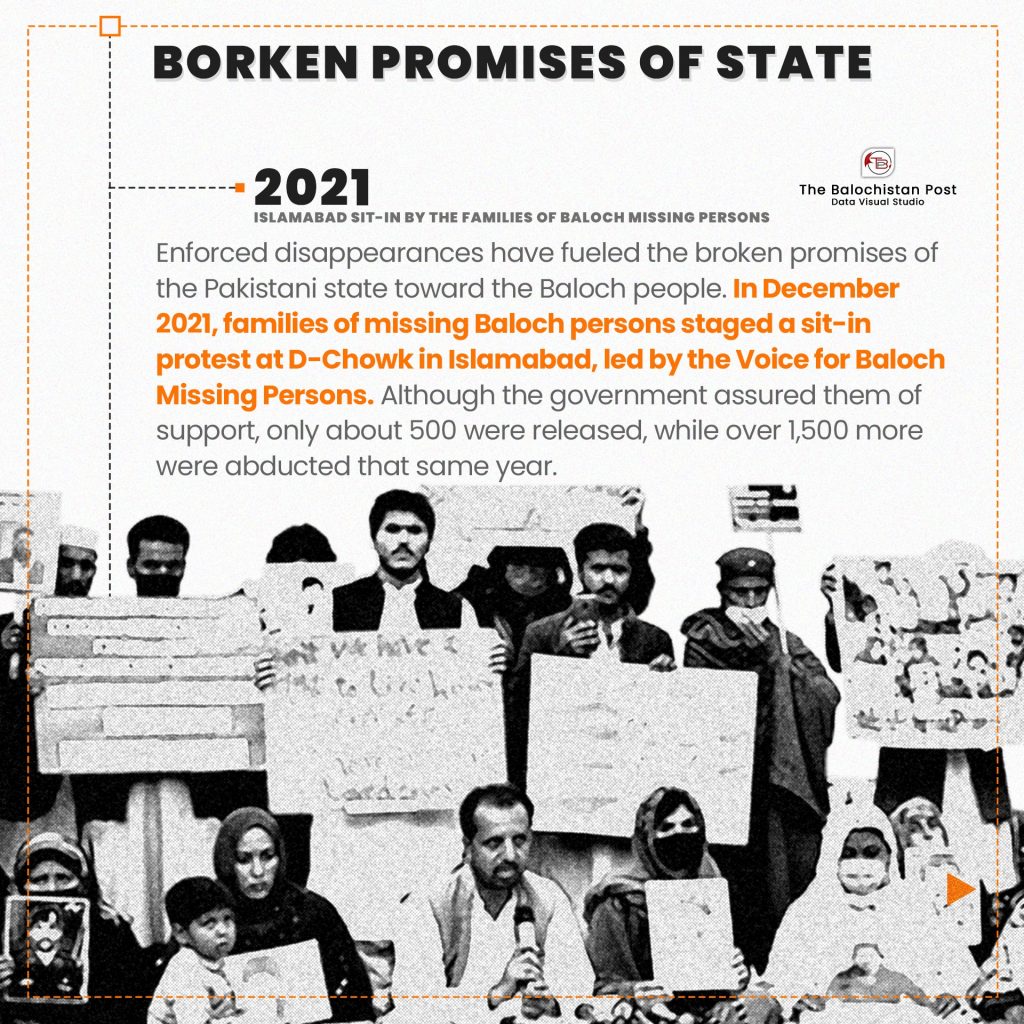
However, this optimism was short-lived. While 500 individuals were released, over 1,500 new cases of enforced disappearances were reported that same year, shattering any hope that the state was genuinely committed to resolving the issue. The Islamabad sit-in, though it garnered national and international attention, ultimately failed to bring about significant change. For the Baloch people, the state’s empty promises were yet another example of the government’s unwillingness to address their legitimate grievances.
2022: Quetta Red Zone Sit-in
In 2022, the families of Baloch missing persons once again took to the streets, this time in Quetta, after a particularly egregious incident involving a staged encounter. Pakistani security forces allegedly killed 11 individuals in Ziarat who had been previously abducted, a fact confirmed by their families. This led to widespread outrage, prompting protests in Quetta’s Red Zone. The government, represented by a high-level delegation of federal and provincial ministers, including Interior Minister Rana Sanaullah, promised an investigation into the incident and efforts to locate and release other missing persons. For a brief moment, there was hope that justice might finally be served.
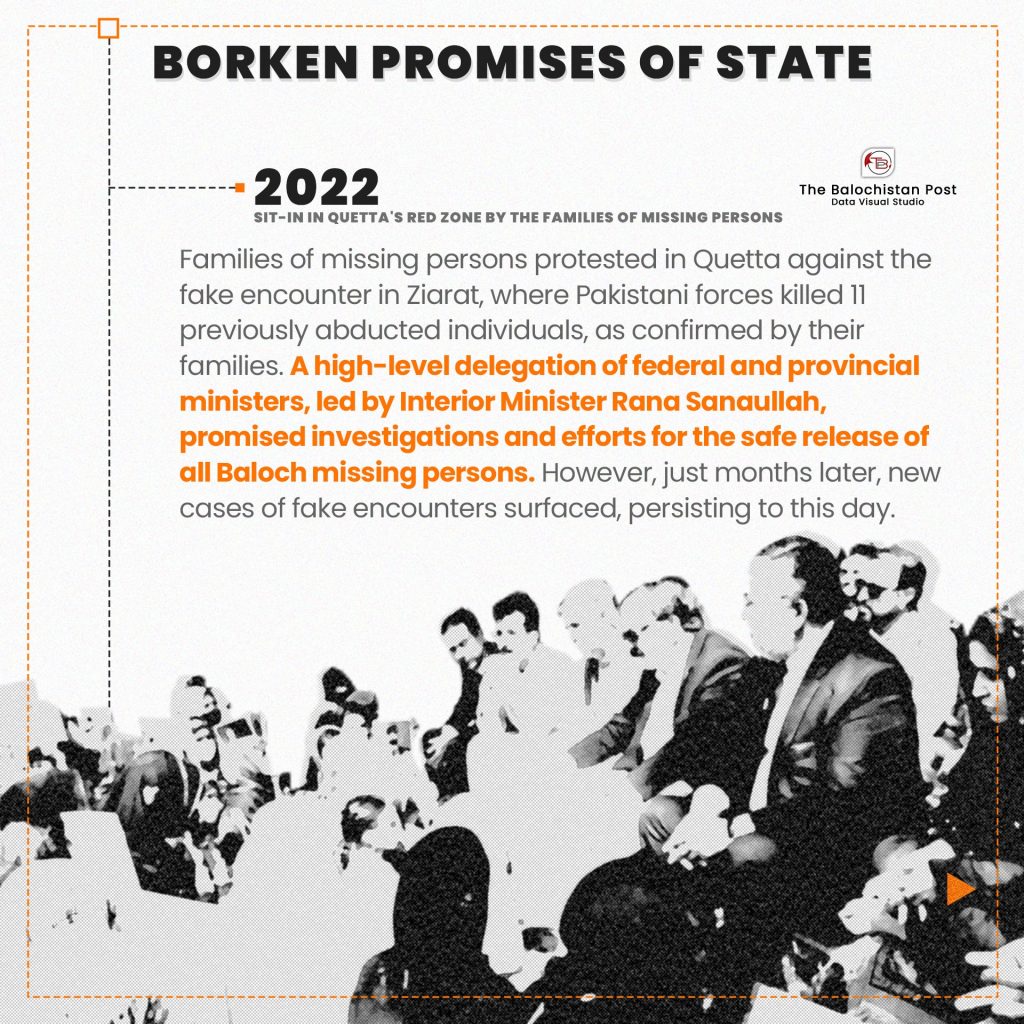
Yet, just a few months later, the promises made during the Quetta sit-in were forgotten. New cases of staged encounters and enforced disappearances surfaced, demonstrating that the government’s assurances were nothing more than a temporary measure to placate the protesters. The families, once again, found themselves betrayed by the state, and the cycle of mistrust continued.
2024: Baloch Raaji Muchi Protest
In 2024, another protest erupted in Gwadar, organized by the Baloch Yakjehti Committee (BYC). The protesters were demanding their basic rights, including economic opportunities and an end to the militarization of their coastal region. After days of unrest, the BYC and the Pakistani government reached an agreement, with state officials promising that no charges would be filed against the protesters and that their demands would be considered. For a moment, it appeared that a peaceful resolution had been reached, and the protesters called off their sit-in, believing that their voices had finally been heard.
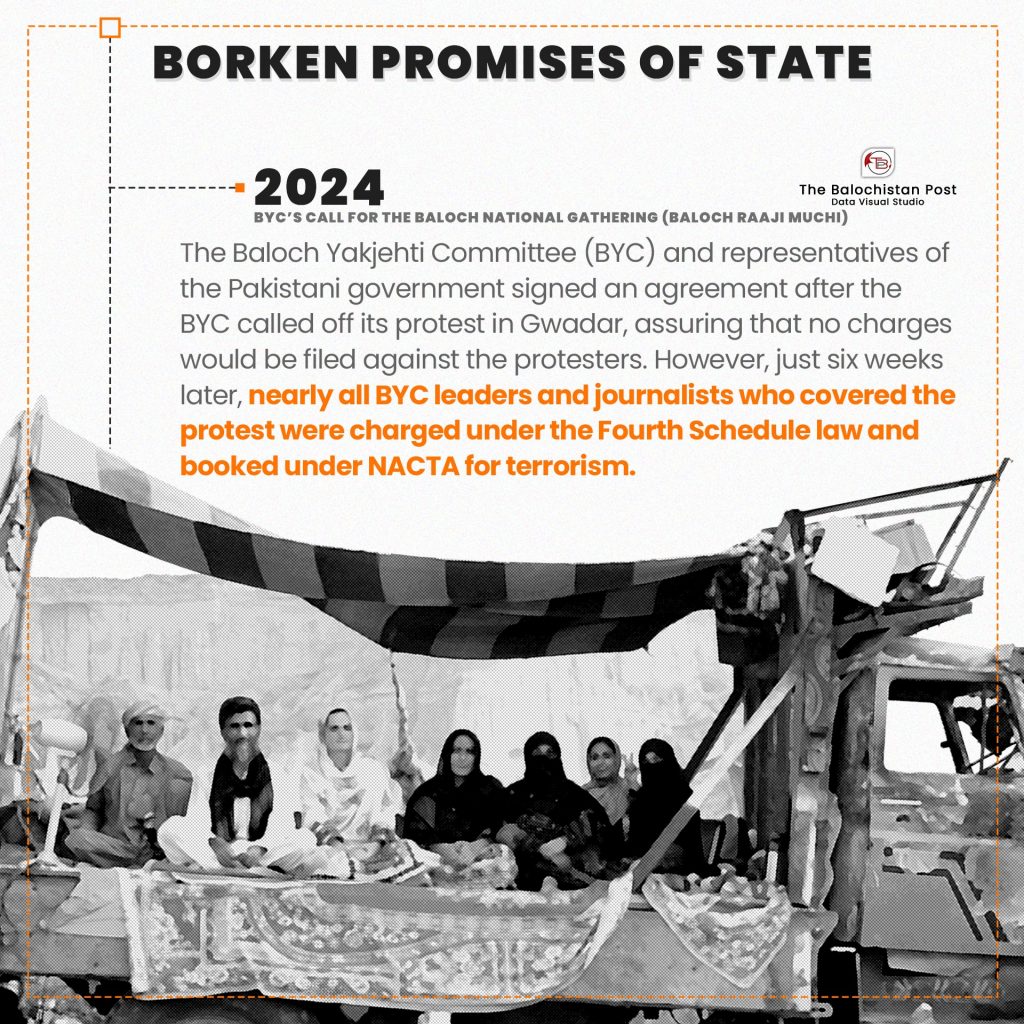
However, within just six weeks, the state once again broke its word. Almost all of the BYC leadership and several journalists who had covered the protests were arrested and charged under terrorism laws, including the Fourth Schedule and the National Counter Terrorism Authority (NACTA) regulations. The arrests of protesters and journalists sent a chilling message: even peaceful dissent would not be tolerated, and the state was willing to go to any lengths to maintain control over Balochistan, even if it meant violating its own commitments.
Conclusion
The unbroken chain of broken promises between the Pakistani state and the people of Balochistan has left a lasting impact on the region’s social and political fabric. Decades of betrayals — ranging from the annexation in 1948 to the recent protests in 2024 — have deeply eroded the trust that the Baloch people might have once had in the federal government. The unfulfilled promises of autonomy, development, justice, and basic rights have left Balochistan feeling marginalized, exploited, and ignored, while its resources are plundered for the benefit of other regions. For many Baloch, the state is no longer seen as a protector or ally but as an oppressor, willing to use any means necessary to maintain control.
The impact of these broken promises is profound. It has not only fueled a persistent sense of alienation and resentment but has also perpetuated cycles of unrest and resistance. For the people of Balochistan, the repeated betrayals have reinforced the belief that their aspirations for self-determination and justice will never be realized under the current system. As long as the state continues to prioritize exploitation over engagement, and repression over reconciliation, the chasm between Balochistan and the rest of Pakistan will only continue to widen.






























